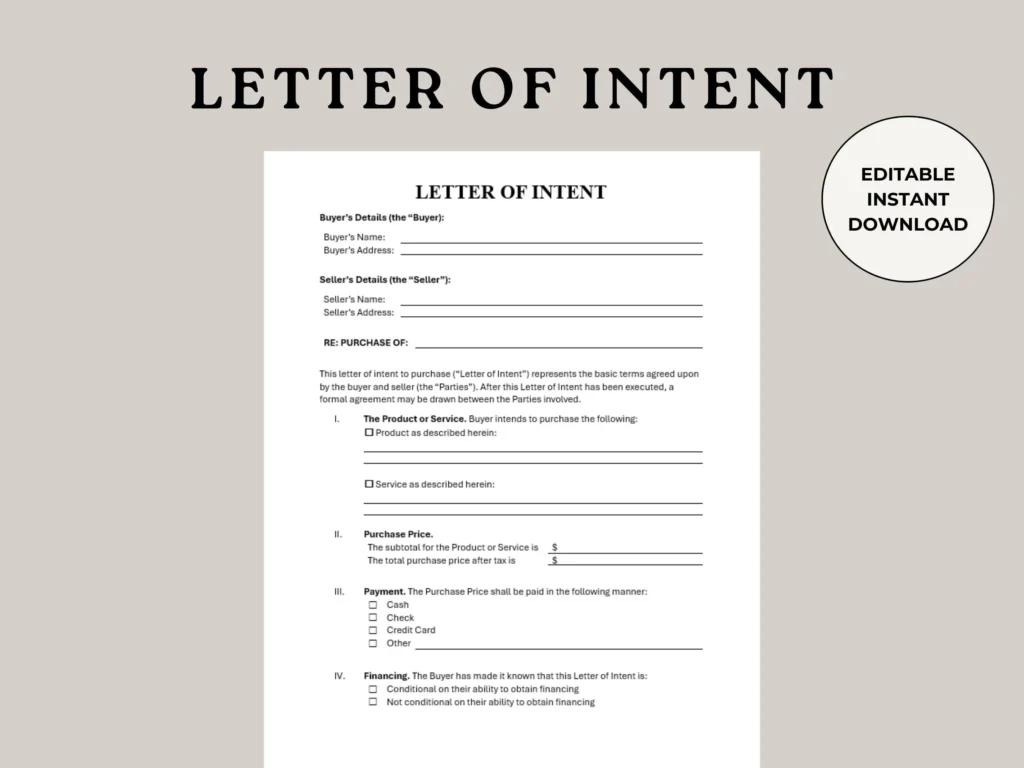A Letter of Intent (LOI) is an important first step in the real estate transaction process. Though it’s typically non-binding. It lays the groundwork for negotiations and outlines the key terms and conditions that both the buyer and seller agree to in principle.
Whether you’re buying or selling in Nevada, this document helps clarify intentions and sets the tone for the deal ahead. In this guide we’ll walk you through the core elements of LOI Template For Real Estate Purchase In Nevada.
What is a Letter of Intent (LOI) in Real Estate?
An LOI is a document that expresses one party’s intent for the buyer to move forward with a real estate deal. It’s often used early in the process, before a formal agreement is made to outline the basic terms and conditions under which the parties intend to proceed.

Even though an LOI is non-binding, it’s an essential step because it outlines the most important aspects of the deal, things like the purchase price, earnest money, contingencies, and timelines. This reduces misunderstandings and helps everyone involved have a clear understanding of the deal’s scope.
Why Do You Need an LOI Template For Real Estate Purchase In Nevada To Purchase?
In Nevada! Having an LOI isn’t just a formality. It’s a smart move for both buyers and sellers. Here’s why:
- For the Buyer: An LOI shows that you’re serious about the transaction and signals to the seller that you’re committed to moving forward. It’s a great way to establish trust before diving into more detailed contracts.
- For the Seller: It shows that you’re dealing with a legitimate, interested buyer, which can help you prioritize serious inquiries and avoid wasting time on those who aren’t committed.
Read More: Is Real Estate Investment Trusts a Good Career Path? – Find Out Now!
Key Elements of an LOI for Real Estate Purchase in Nevada!
When you sit down to draft an LOI for a real estate purchase in Nevada, there are a few core elements that should never be overlooked. These sections ensure clarity and make sure that both parties understand what’s being proposed.

1. Property Details:
Make sure to include the property’s full address and parcel numbers. You should also add a brief description of the property, including its current condition, unique features and any specifics about zoning or land use. The clearer you are the less chance there is for confusion later.
2. Purchase Price and Payment Terms:
Specify the purchase price you’re offering and any details regarding how the payment will be made. Will it be all cash or will you need financing? If financing is involved clarify whether there will be contingencies for getting approved for a loan.
3. Deposit and Earnest Money:
The earnest money deposit shows the seller you’re serious about the purchase. The amount can vary, but it’s generally a percentage of the purchase price. Be sure to specify how much the deposit will be and under what circumstances it will be refundable.
4. Contingencies:
Contingencies protect both the buyer and seller by allowing for the deal to fall through if certain conditions aren’t met. Typical contingencies include:
- Financing approval
- Property inspection
- Title search
Make sure to list any contingencies clearly in the LOI.
5. Timelines and Deadlines:
Setting clear timelines for things like due diligence, inspections, and the closing date is essential. It keeps both parties on track and ensures you’re all working toward the same deadlines.
How to Create an Effective LOI Template for Real Estate Purchases in Nevada?
Creating an LOI template doesn’t have to be complicated. Here’s a step-by-step breakdown to ensure yours covers all the bases:
- Start with Basic Information: Begin by listing the names of both parties, the property address, and the purpose of the LOI. This is the foundation of your document and makes it easy to identify the deal from the start.
- Outline the Terms: Clearly specify the purchase price, deposit amounts, and any contingencies that are important to the transaction. This ensures that both parties know what’s expected and can avoid surprises later.
- Include Contingencies and Deadlines: Don’t forget to add any necessary contingencies (e.g., financing or inspection) and specify deadlines for key actions like inspections and closing. These time frames help ensure the process moves along smoothly.
- Consult Legal Professionals: Even if you’re using a template, it’s always a good idea to have a real estate attorney review the document. A lawyer will ensure that your LOI complies with Nevada law and protects your interests.
Read More: How Many Jobs Are Available In Real Estate Investment Trusts?
How To Get Free LOI Templates for Real Estate Purchases in Nevada?
If you’re looking for a free LOI template for your real estate purchase in Nevada, several online resources can help. Websites like eForms, LawDepot, and UpCounsel offer downloadable templates that you can customize to suit your transaction.
While these templates provide a helpful starting point, make sure you personalize them to your specific situation. Tailoring the template ensures that you address all relevant details and comply with Nevada’s legal requirements.
Sample LOI for Real Estate Purchase in Nevada!
Here’s a simple example of what a real estate LOI might look like for a residential property purchase in Nevada:

| Section | Details |
| Property Address | 1234 Main Street, Reno, NV 89501 |
| Purchase Price | $250,000 |
| Earnest Money | $5,000 (Refundable) |
| Financing Contingency | Subject to buyer securing mortgage loan |
| Inspection Contingency | Buyer has 10 days for property inspection |
| Closing Date | August 1, 2023 |
Legal Considerations for LOI Templates in Nevada
While LOIs are generally non-binding, it’s important to recognize that certain clauses can still be enforceable under Nevada law. For example, confidentiality agreements, exclusivity clauses, and even break-up fees can carry legal weight if they’re included in the LOI and agreed to by both parties.
Non-Binding vs. Binding Provisions in an LOI:
Typically, an LOI is non-binding, meaning it doesn’t commit either party to go through with the transaction. However, provisions like confidentiality or exclusivity agreements may be enforceable if clearly stated.
Dispute Resolution:
While an LOI is non-binding, it’s still beneficial to include a dispute resolution clause. This outlines how disputes will be resolved in case a disagreement arises. In Nevada, this might include mediation or arbitration before resorting to court.
Property-Specific Regulations:
For certain types of properties (e.g., commercial real estate or properties in flood zones), Nevada law may require additional disclosures or special consideration in the LOI. It’s essential to ensure that these considerations are addressed, or the LOI could be deemed incomplete.
Contingencies and Deadlines:
Contingencies such as financing approval or inspections should be carefully worded to avoid unnecessary legal complications. For instance, deadlines for securing financing should be realistic and clearly defined. If deadlines aren’t met, it could cause confusion about whether the LOI remains valid.
Role of Legal Counsel in LOI Drafting:
Although using a template is convenient, it’s always a good idea to consult with a lawyer. Legal counsel will ensure that your LOI complies with all applicable laws and includes any necessary clauses to protect your interests.
Read More: Invest1now.com Real Estate – Smarter Investment Of 2025!
Letter of Intent to Purchase Commercial Real Estate in Nevada!
Commercial real estate transactions in Nevada tend to be more complex such as office buildings, shopping centers or industrial spaces. The LOI for these types of properties may have additional elements to consider, such as tenant leases, environmental assessments, and zoning laws.
Here’s a sample of a commercial real estate LOI for Nevada:
| Section | Details |
| Property Address | 456 Business Blvd, Las Vegas, NV 89101 |
| Purchase Price | $3,500,000 |
| Earnest Money Deposit | $50,000 (non-refundable after due diligence) |
| Due Diligence Period | 60 days from LOI acceptance |
| Closing Date | Within 90 days after due diligence |
| Financing Contingency | Subject to securing commercial loan of $2,500,000 |
| Lease Agreements | Current tenants: 10-year leases, with 3% annual rent increase |
| Zoning and Land Use | Zoned for commercial office use, no restrictions |
| Special Conditions | Buyer will conduct environmental impact assessment |
Common Mistakes to Avoid When Drafting an LOI!
Even though an LOI is non-binding, it’s still crucial to avoid some common mistakes that could complicate things later:

- Lack of Specificity: Make sure all terms are clearly defined. For instance, instead of using vague terms like “reasonable price,” specify the exact purchase price. Clear, precise language avoids confusion down the road.
- Forgetting Contingencies: Contingencies are your safety net. Don’t leave them out! Missing contingencies like a financing clause or an inspection contingency can leave you vulnerable if something goes wrong.
- Skipping Legal Review: Though an LOI is non-binding, having a real estate attorney review it is still important. An attorney can catch anything that might be missing or potentially problematic in the document.
FAQs About LOI Template For Real Estate Purchase In Nevada:
How to write a LOI for real estate?
To write an LOI for real estate, include key details like the property’s description, purchase price, terms of sale, due diligence period, contingencies, and the intended closing date. Keep it clear, concise, and non-binding, outlining the basic terms of the agreement.
What does a letter of intent look like for real estate?
A real estate LOI typically contains sections such as the buyer and seller’s information, the property description, proposed purchase price, financing terms, contingencies, and deadlines. It serves as a preliminary agreement to show interest in purchasing the property.
Does a letter of intent need to be notarized?
No! a letter of intent does not need to be notarized. It is usually a non-binding document, meant to outline the intentions of the parties involved, and notarization is not typically required.
What is the difference between a purchase agreement and an LOI?
A purchase agreement is a legally binding contract that finalizes the terms of the sale, while an LOI is a non-binding document outlining the preliminary terms of the deal and the parties’ intent to negotiate further.
Can an LOI be amended?
Yes! An LOI can be amended if both parties agree to the changes. However, any amendments should be made in writing and signed by both parties to ensure clarity and avoid misunderstandings.
Is an LOI legally enforceable?
Generally! An LOI is non-binding. However, specific clauses like confidentiality or exclusivity agreements can be enforceable if explicitly stated. It’s always best to consult a lawyer to ensure you understand what provisions are binding.
Conclusion:
The Letter of Intent (LOI) is an essential document for real estate transactions in Nevada. Whether you are purchasing residential or commercial property an LOI helps establish clear expectations. The LOI Template For Real Estate Purchase In Nevada protects both parties and sets the stage for a smoother transaction. By understanding the components of an LOI.
Whether you use a free template or hire a professional to draft one, make sure that the LOI is tailored to your specific situation and compliant with Nevada’s legal requirements.
Read More:
- Team Yarmo Real Estate Group Agency – Top Listings of 2025!
- Commercial Real Estate Agent – Salaries and Courses in 2025!
- Biitland.com Digital Assets In 2025 – Future of Crypto!
